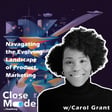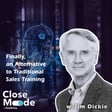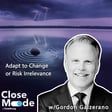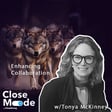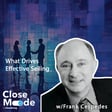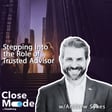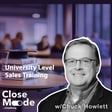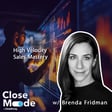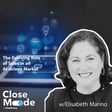Introduction of Gabe Lulo, CEO of Aleup
00:00:04
Speaker
Hello and welcome to another edition of Close Mode, the enterprise sales show. I'm Brian Deitmeyer, CEO of Close Strong. And today I'm super fortunate to be here with Gabe Lulo, CEO of Aleup. And for those of you who don't know what they do, Aleup provides demand gen at scale for startups like mine and established brands, maybe like yours. Gabe, welcome to the show.
00:00:25
Speaker
Well, thank you so much for having me, Ryan, a super, by the way, huge fan, super big fan of yours and really excited to be here. So thanks so much for having me. Thank you.
The Importance of Social Proof in Sales
00:00:34
Speaker
So we were, we were chatting last week and you kind of, you sort of rocked my world a little bit on an idea. ah You mentioned that social proof ah is more important than say, even sales methodologies these days. In fact, you you made a point.
00:00:47
Speaker
that it's it's more about marketing than sales these days so i really want to unpack some of this kind of that i had so many questions in our free call that now i'm now i want to unpack and get under those so that yeah the first one i want to start at a high level i think we all get what what social proof is but i want to hear gabes definition of social proof.
00:01:08
Speaker
Well, I think it's important right now that founders, executives, even the go to market team, the operation people even to create content, you know, and there's a big movement right now and LinkedIn and other social platforms, you know, I think Adam from RBTV, he was talking about inbound, lead outbound and, you know, creating social proof I spend, I'm the chief executive officer of a multi-million dollar agency. And I'm spending 30% of my week on content creation.
00:01:36
Speaker
you know, doing podcasts such as this, you know, writing writing for my LinkedIn profile, working with my team to ask them questions and and talk about, you know, thought leadership and what what industry trends are happening. And so when we put all of that out there in the hyperspace and the in the World Wide Web, we call it, right?
00:01:55
Speaker
that hopefully hits people. And when they come into our conversations, whether it's a partnership meeting, whether it's a demo, whether it's, you know, an existing client, ah talking about a new strategy that we want to implement, they're seeing that usually ahead of time, and that that social proof is happening. So when we go into those conversations,
00:02:16
Speaker
It's not about hey let me tell you about our company and how cool we are it's hey i already know all about your company i just want to know what can you do for me and here's the problem that i have and how can you solve it. And so that's what i mean by social proof and that's what we're doing. So why why do you think that is i mean it was is it something's changed sort of in the larger market that that makes it smarter now or it's always been smarter we just weren't doing enough of it like what what shifted to make this more relevant.
00:02:44
Speaker
Well, I think you know the TikTok generation, the social media generation, I think right now we have access, especially with AI tools, we have access to research and we have access to things that we've never had before.
Data and AI: Transforming Sales and Marketing Strategies
00:02:56
Speaker
Doing a cold calling campaign 10, 15 years ago, um you know we didn't have that tools. We didn't have the research. We didn't know much about it other than maybe what Hoover's told us about it. right Now data is a commodity. There's huge data companies. AI researching tool is is almost becoming a commodity.
00:03:13
Speaker
social is really where we get not only our news, but all of all of our information these days. So using that as a tool and not getting away from it is really important, even if you're doing an outbound campaign, which is, by the way, what we do. So yeah, it's, it's it's not a silver bullet, but it definitely is one of the ingredients to the recipe for sure.
00:03:35
Speaker
So you also made another point about, which which I agree with. So nobody's going to read that long PDF for marketing, right? the the The world has just changed, but buyers are responding to social proof. And I guess this is linked kind of to my last question. Why
Authenticity in Content and Buyer Behavior
00:03:49
Speaker
is that? Is it just because even buyers who have been around for a while are now part of the TikTok video generation? Why are they responding to this?
00:03:58
Speaker
Well, I think I think it's more authentic. I think it shows human connection. I think everyone is behind their screens. And, and here's the deal. You know, 10 years ago, every single buyer was always asking, Hey, can you send me a white paper? Hey, can you send me a case study? Hey, can you send me you know, a dashboard of a client that was similar to ours, and you can show us those metrics.
00:04:17
Speaker
They don't ask those. any I've never been asked I think in the last six years, five years at least for a white paper. Case studies, yes, here and there for sure. But what we're doing, what our sales team is doing is they're sending a podcast that's relevant. They're sending you know ah a blog that's relevant. They're selling sending a newsletter that's relevant. ah They're sending a LinkedIn post that kind of hits what some of the things that were talked about in the demo and using that as the follow up or as the third party Verification or as the the tool to leverage the conversation to move it forward and I think that's just the way we live in today Yeah, I think I think you mentioned something like a follow-up to a call going. Hey, hey, let let me ping it with this blog I just did on that subject right exactly. It's such a great
Role of Go-to-Market Leaders in Content Creation
00:05:00
Speaker
is that such a great follow-up so a in a small from like mine a startup and in yours me I don't know if I call I call you medium and Like we, you and I play that role, but in large enterprises, you know, Google, Microsoft. sure Who, who plays that role?
00:05:16
Speaker
Yeah, I think really it's the go to market up leaders. You know, I think in a bigger company, you're looking at your VPs of sales. I think you're looking at your CROs. I think you're looking at your CMOs. You know, a chief marketing officer had for years have been, you know, in charge of, you know, grading a great brand on the LinkedIn page for that profile of the company. But now you're seeing them actually creating content on their own profile and it it has to be more organic.
00:05:42
Speaker
Like we're not paying much attention at all to our LinkedIn profile, but we're paying a ton of attention on my account executive profile or my head of talent profile. My COO does two to three of a video posts on the internet a week. Now she's supposed to be operating and running the company, which she does, but she's still creating content on her own profile. And so it's creating that authentic conversation. Like, oh, this is not just a company sanctioned, you know, video or a company sanctioned marketing piece. This is.
Creating Authentic Conversations Through Content
00:06:10
Speaker
a thought leader who is an expert in the space, who's talking organically about something that's important, and hopefully it hits someone and it and it hits the audience that we're looking to go after. So you prompt a couple more questions. so First of all, I love that notion. that It felt right to me. like it's It's authentic. When we're out here doing what we're doing right here, yeah this is two guys talking talking about this reason. I think it's it's pretty damn authentic. the The other thing you mentioned was, you know kind of your whole team does this, which which is fascinating. that's That's a little bit more insight for me.
00:06:44
Speaker
And and then in in the bigger organization like it's you know to go to market lead whoever it is but but the other thing so i wonder. How do people get chopped to do this right because you get this is not just hey i want you out there go to market leader posting once a week or the other people on your team right don't have to put some brackets around this in some way.
00:07:06
Speaker
Yeah, it's interesting because in first it was like, okay, this is all that we have. Oh, by the way, I have this idea, we should start doing this. And I remember one of those individuals like completely scared about it. Like, that would no way it is not what i see iss not my job description, right? um By the way, she's an expert now and she produces content to the best of them. It's it's amazing. The metamorphosis that I've seen from you know not every like nothing on social media even her personal accounts to now she's like a guru right it's pretty cool to see but now truly what we're doing is when we're adding new members it's a part of our recruitment process hey listen one of the things that we would be asking of you even though you're the record you're gonna be the head of talent in our part of our recruitment team.
00:07:49
Speaker
is we'd like to have you get on an internal podcast and write content about you know what it what it feels like working here. What what do we look for in the the right person? What's our culture all about? and And have those types of discussions and put yourself out there. ah Would that be a problem? And we ask that literally in the interview process now if we feel like that is an important a person to be on social and you know it's part of our vetting ah now for for finding people.
00:08:16
Speaker
Really, really interesting to me. So video is, is a vehicle that we use. Obviously you talked about kind of blog posts or LinkedIn posts. Are there other, other tools?
The Critical Role of Video Content and In-House Videography
00:08:30
Speaker
ah what What else? How else do we distribute this knowledge?
00:08:33
Speaker
Yeah, well, we hired a videographer in house, like that was my first right, you know, we could we could have outsourced it, or we could do it in house. So we actually found a really talented videographer. And literally, she works for us full time. And so she's creating video content every single week. That goes to our our writers and and our thought leaders. And and then we we create content together. But it's in house at this point with our video team. And it's in we think video is You know, like I said, we're in this tick tock generation. We're in this Instagram generation and YouTube generation. And, and it really does hit home and and nothing beats face to face, but video is the close second, you know? Yeah. So I wonder as, and and I was thinking about this, like for for my own business, like what role it plays in terms of, um, sort of top of the funnel lead gen or to social proof, help you sell an active opportunity.
Content as a Major Source of New Business
00:09:25
Speaker
Did, would you say it's biased one way or the other?
00:09:29
Speaker
I will say right now, 60% of our new business is coming from content. Now, whether that is an outbound call that we did and it said, Hey, yeah, I saw you on LinkedIn, and you know, I'd love to hear more about what you do, or whether it is an inbound call that came into us because they saw something that resonated and they reached out to us.
00:09:49
Speaker
And so those are the two ways we're tracking it. There's a third way we have a big partnerships program. So we have a network of, of go to market leaders that are referral partners of ours. And by the way, we attract all of them through our social content. So that of course is another way of looking at it. um So we look at our business, new business every month in three real sources, pure content creation.
00:10:14
Speaker
partnership, and then our own outbound efforts. And we're sitting at about, you know, a third for each right now. But we are seeing content and partnerships ah really have a big uptick at this point.
00:10:28
Speaker
So ah if we, do you think there's a place, and if we take a traditional sales cycle from like Qualify, um Discover all the way through to Negotiate and Close, is yeah is it playing a role, you know, and more in the earlier stages, or would you say that you're using this this content all the way through the sales cycle?
00:10:48
Speaker
all the way through. I mean, how many of us get emails right with the bump, or hey, did you see my last email or hey, just checking in or hey, just following up or hey, just want to bump this real quick. Like I hate those emails. And I make fun of them on LinkedIn, by the way, usually I blog a lot about that. Nice. But I make fun of them because there's no value there. It's you know, if if they didn't respond to the first or second one, bumping it up is probably not going to do anything but annoy them.
00:11:16
Speaker
Now, I always will say the fortune is in the follow up. I'm not saying don't follow up. It's actually the best and most important thing to put the deal forward. However, follow up with relevancy, follow up with value. So what can you do to make that happen? Hey, Brian, I just saw this really cool podcast. It reminded of us of our conversation we had two weeks ago. This one really hits home for us yeah too, because we feel in the same we do the same things and that was talked about on this podcast. ah Let me know what you think.
00:11:45
Speaker
and send that in a link and send that in a note. That's a strong, authentic, powerful, organic follow-up and provides value and hopefully continues the conversation moving forward. And that's how we do it.
00:11:59
Speaker
So I wonder how this plays in. So I think about, you know, I've heard just so much that organizations are sort of swimming in, in content and
Aligning Sales and Marketing Teams
00:12:09
Speaker
tools and resources. And now there's content management systems that like put all that stuff in one place. And it's, and this is my chance to pick on something now. I often joke that it's like, I can put everything in one place that reps are not going to use, but at least you can find it easier. You know, there, there was a stat that came from American marketing association at 90% of the content.
00:12:28
Speaker
produced by marketing goes unused by sales. So help me discern that, like we've got so much content. People aren't using what we have. well why Why this? Well, I think it's because of that old broken ah you know department of sales and marketing, right? you know And and they've had been they've been at war forever. yeah And I think it's the same thing that we see all the time where sales teams don't talk to marketing, marketing don't talk to sales.
00:12:57
Speaker
and If they do, they're talking about them badly. right and They're blaming each other. and it you know You have to get your sales and marketing in the same room. You have to get them in the same Slack channel. You have to get them in the same group. You have to get them you know marching in the same direction. and As soon as you get that going, then it's almost as if they're a part of it. right Our sales team are content creators online.
00:13:21
Speaker
So our sales team is working with the marketing team to create their content. And on the flip side, you know, the sales team is also using that content to close deals. So they see the value in it now. And so they are prone to work with the marketing team, because it's helping them hit their quotas, right? So they're working very well together. And they're almost getting excited about the the videos that are going to be coming out on Friday, so they can start writing on them because they know that If they do great content, oh my god, I'm going to be able to use this one to close that deal next week. like They're getting excited. It's almost that competitive nature of what a sales floor brings to the table, but you're tying in the marketing team too and it's it become very synergistic.
00:14:02
Speaker
So yeah, that, that leads into, you know, when, when we first spoke and you were talking about methodology, like, Hey, this is more important than methodology. So that, you know, this changes the way we enable sales reps, right? And, and I think that easy answer to that is yes, but, but how?
Skill Building through Content Creation
00:14:18
Speaker
Like, well what do we, yeah. Well, I think it gets salespeople, there's a problem right now, I think in the market where account executives are just way too green.
00:14:28
Speaker
You know we've lived in this world where you know sass was able to spend a ton of my own marketing they've been living on inbound leads. They haven't had to make any cold calling or prospecting themselves and it just been like so gravy. And then over the last few years that has dried up significantly.
00:14:47
Speaker
Funding is not there, budgets are constrained, marketplaces are small, more follow-up needs to be having, longer sales cycles and are happening, more touch points to get to the conversation. And so these AEs have to work harder, they have to be better, they have to be more skilled. And so I think it's forcing, long story short, it's forcing these account executives who were asking to create content to learn, to do, you know, personal development, to see trends, to have something to talk about on these blogs. And in turn, they're becoming more educated, they're becoming smarter, they're becoming more impactful, and they're becoming better at their sales job. And I think it's, it's a longer play for sure. But, you know, we've had you been doing this for a while now, and we're seeing our salespeople being so much more valuable because they've been spending time on creating content.
00:15:43
Speaker
Does that make sense? Yeah, yeah, it, it, it it does. and And I didn't realize when we first started talking about this, I mean, you talk about your, your other peers, the other execs in your company. Now you're talking about reps creating content like this, this, this is a whole ecosystem you're here, you're, you're talking about. And there was a buyer study out there that Jim Dickey authored and, and this is really scary. Buyers said that sellers are ninth out of 10 places they go for insight.
00:16:12
Speaker
which is really damning. But the good news in this study also said, if you got something to bring to me, I will still see you. But I'm just not seeing you now because you have nothing to bring to me. So that that kind of feeds right into that, doesn't it? Yeah, it does. And I think the biggest word if it could be just one that we've learned and haven't gotten out of all of this initiative, its it just boils down to one simple word and that's trust.
00:16:38
Speaker
Right? You know, a lot of people don't quote unquote trust salespeople, you know, that's been a stigma for decades. But this is putting by exposing them and by putting them out there by making them a real human person and seeing their flaws and seeing what's like I put, you know, I put a post two weeks ago about my wife and I going out to dinner and we went to a a cool tree house restaurant in the middle of the woods. It was like the coolest place ever. And I just posted it. It had more likes and engagement and more impressions than any of my posts. and But it was interesting because and it was on LinkedIn and it was interesting was and that it humanized me, right? When I got married a year ago, I put a picture of us getting married and it like went viral. And now that's not all I post. Nine nine nine out of 10 posts are about what we do and how we do it and all this amazing business stuff.
00:17:28
Speaker
But those those authentic ones just go viral. And here's what's happened. People trust me. People, you know, believe when I tell them the things I tell them because they know I'm a real person and I'm driving them the truth. Yeah, I mean, like I'm not, you know, I am who I am. And and and yeah so it it puts you out there. And it makes against salespeople trustworthy again, I believe.
00:17:49
Speaker
Wasn't that Popeye? I am who I am. Didn't he say that? I am who I am. With some eager spinach, I think is what it is. yeah I heard Popeye's voice when you said it.
Filtering Content for the Right Audience
00:17:59
Speaker
um So my my my last question for you has to do with sort of a a how-to. And this is selfish. so some of it Some of it's my own question. But for for those for those who are listening slash watching, I wonder, do you need and sort of a content architecture or category? like Is someone have to drive the like vision and mission of this thing to go? Like, yeah, here here's the four or five categories we want to ah sort of produce content. and And then the second piece, the follow up to that is, is there then a filter before something goes live? And I'm sure yours doesn't get filtered, but anyone below your, is there a filter? So if you could hit those two points.
00:18:37
Speaker
Yeah, and I like to bring in a third if I could, right? Sure. Because the answer is yes to both of those questions in short order. And i'll I'll explain. But the third is you have to also make sure that you're, you're going after to the right audience as well and building the right audience to those initial point, right? Okay.
00:18:54
Speaker
So like you know when we when I'm targeting people on LinkedIn, i I think about every single person I try to connect with or every single person i'm I'm looking to follow myself are people that I would want to see my contact. That's how I look at it.
00:19:10
Speaker
So I when I'm building my audience, I'm like, okay, do I want this person to see all my content? And not because I'm hiding anything, it's because I want them to be seeing a lot of our content to get value to hopefully potentially sell to them. And so that that's what we look at. So building the audience is very important.
00:19:28
Speaker
Now, secondly, yes, we do filter everything. And by the way, they have the right to edit, change, update, and and all of our content creators have that autonomy. It's their word, so they're they're the last person who agrees with it to make sure that you know it's it's on their language and their brand. And then it hits my desk. And I just do a final review, and it's OK.
00:19:51
Speaker
as the, you know, the buck stops with me type of person when it comes to the CEO role, I just look at us, okay, do we feel this is something that we can deliver on? Like, right, I don't want to ever, you know, under promise and over deliver. And so of this message that we're putting out in the world,
00:20:09
Speaker
doesn't speak to the things we can service our clients with, then I don't want it going off. And that's really my last filter is just, yeah, we do this. Well, actually, we don't do that. So let's not say that, right? So those are things that I look for, but I want it to be as organic and and as authentic from their voice as possible.
00:20:25
Speaker
Yeah. And I, and I may have, I, I broke my agreement. That wasn't my last question. You made me think of more. I have two more follow-ups. Should be quick. I'm here for you, man. Thank you. So one, one has to do with sort of volume. You were saying you, I thought of this when you said this stuff lands on my desk. um Give me and just a ah ah rough number of like pieces per week um that are going out there into the world.
00:20:48
Speaker
We're doing 22 pieces per week right now. Oh, perfect. Not even approximate. Yeah, no, precisely. So
Aleup's Content Production Strategy
00:20:54
Speaker
that's what we're doing. We're doing 22 pieces a week that are sanctioned by our company. But I will say there's another layer of our even our SDRs are not creating their own content. I don't check those. I let them do that for themselves. Excuse me.
00:21:10
Speaker
But we we do encourage them and we give them inspiration. We do give them things to think through and like. And and i do if I see something online that you know comes from one of my employees and it doesn't make sense, I would i let them know. So, hey, you know this doesn't really resonate, but you know A for effort, right? But at the end of the day, there's 22 pieces a week as of right now that we are delivering on that that are approved by me.
00:21:34
Speaker
so You're an expert in demand, Jen. So what what percent of these 22 pieces is tied to some thought leadership in demand, Jen, roughly? Yeah, I would say, like I said, it's it's about 80 20. So we we're doing 20% that personalization. Okay, you know, thank I got a recruiter on my team, and she goes on a trip. And she does a picture when she's traveling be like doing that, because we're a fully remote company. So it's promoting fully remote work. So it technically is about, you know, our brand and what we do. But at the end of the day, it's a very, you know, more personalized post.
00:22:09
Speaker
But eighty percent of her is her you know actually talking fundamentally about recruitment and the sdr role and what's important in technology and tools that we use and what best in class ways of doing demand gen and and so i would say eighty percent of all of our content pieces. Is very hyper focused on what we do and then the other twenty percent creates that you know humanization to it.
Balancing Thought Leadership and Commercial Content
00:22:34
Speaker
How do you draw that fine gray line between a commercial and thought leadership, right? Because if you put out 22 pieces a week, and they all feel like, you know, an ad or a commercial, then that's not going to do what you're talking about. So I know you've figured that out. how do How do you how do you discern?
00:22:49
Speaker
Yeah, very minimally, would we be ever doing commercial-like things? you know yeah We would tag the company maybe and in 10% of our posts. okay So like you know we can talk about an industry. We can talk about a trend. We can talk about a new tool. And then very rarely would we be saying, oh, and by the way, you know we do that and we're the best. like we don't we don't We don't like going that route, because again, we're not looking to be an infomercial. We're looking to be a thought leader.
00:23:17
Speaker
But I do want them to know, hey, if this hits home, we can help you. um So we pepper that in for sure. But again, it's just a spice. It's not it's not the main dish.
00:23:28
Speaker
Yeah, i i I could go on, but I know there's there's an optimal length for for our podcast. But you've been super super generous with with your time and and or and your ideas. And you know when we started doing this, it it's just like, hey, let's bring all thought leadership to one place. And and you just added added greatly to that. And for those yeah who are watching and listening at at the closedmode.media site, we now have this stuff lumped into categories. So it's kind of ah for me, it's kind of cool. Like if if you're in sales enablement or you're a CRO,
00:23:59
Speaker
And you want to hear what four of your peers are saying. um you You just added greatly to that sort of body of knowledge. So thank you so much. Yeah. And it's so great that you do that because it just makes it so easy because again, to your point, there is so much content that's out there and people are looking and they usually when they are, they're looking for something specific. So for them to be able to come to you and find something very quickly that's specific to what they're looking for. That's awesome.
00:24:23
Speaker
Yeah, and when when when I get a moment, and and if there's any academics listening, I'm so happy, and I'm sure you know now there's finally bachelor's degrees in selling,
Educational Benefits of Podcast Content
00:24:31
Speaker
right? I know, DePaul University and a few other have them. And when I get a moment, think think about this, ah Gabe, for for students, right? You're getting your sales degree somewhere. And to to me, if if I'm teaching at one of those places, I'm coming to podcasts like this and saying, you know, listen to Gabe, listen to Brian, and then come back and tell me what they said about you know, forecast management or or social, you know, ah social marketing. um So anyway, yeah, if you're out there and you're at a university. I was raised by educators. My mom and my aunt are both educators. My mom was a retired school teacher, English. So obviously that's probably where I got some of my wordsmithing in my sales career from. But at the end of the day, you know, I always tell my mom, I'm and um an education too. I just teach adults yeah instead of kids, you know what I mean? So it's the same thing.
00:25:21
Speaker
Yep. Well, I really, this has been a lot of fun Gabe, and hopefully we'll find a chance to talk about something else. Cause I really enjoyed this. Awesome. Thank you so much for having me around. Appreciate it.

